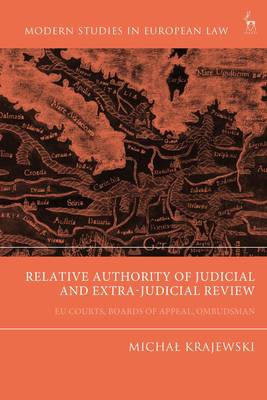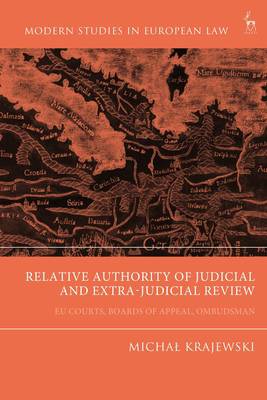
Bedankt voor het vertrouwen het afgelopen jaar! Om jou te bedanken bieden we GRATIS verzending (in België) aan op alles gedurende de hele maand januari.
- Afhalen na 1 uur in een winkel met voorraad
- In januari gratis thuislevering in België
- Ruim aanbod met 7 miljoen producten
Bedankt voor het vertrouwen het afgelopen jaar! Om jou te bedanken bieden we GRATIS verzending (in België) aan op alles gedurende de hele maand januari.
- Afhalen na 1 uur in een winkel met voorraad
- In januari gratis thuislevering in België
- Ruim aanbod met 7 miljoen producten
Zoeken
Relative Authority of Judicial and Extra-Judicial Review
EU Courts, Boards of Appeal, Ombudsman
Michal Krajewski
€ 93,45
+ 186 punten
Omschrijving
Do independent boards of appeal set up in some EU agencies and the European Ombudsman compensate for the shortcomings of EU Courts?
This book examines the operation of EU judicial and extra-judicial review mechanisms. It confronts the formal legal rules with evolving practices, relying on rich statistical data and internal documents. It covers detailed institutional arrangements, the standard of review, the types of cases and litigants, and the activity of the parties in the process. It makes visible the diverse but complementary ways in which the mechanisms enhance the authority of EU legal acts and processes. It also reveals that scarce resources and imprecise rules restrict the scope of review and hinder independent empirical investigations. Finally, it casts light on how a differentiated system of judicial and extra-judicial review can accommodate various kinds of technical and political discretion exercised by EU institutions and bodies.
This book examines the operation of EU judicial and extra-judicial review mechanisms. It confronts the formal legal rules with evolving practices, relying on rich statistical data and internal documents. It covers detailed institutional arrangements, the standard of review, the types of cases and litigants, and the activity of the parties in the process. It makes visible the diverse but complementary ways in which the mechanisms enhance the authority of EU legal acts and processes. It also reveals that scarce resources and imprecise rules restrict the scope of review and hinder independent empirical investigations. Finally, it casts light on how a differentiated system of judicial and extra-judicial review can accommodate various kinds of technical and political discretion exercised by EU institutions and bodies.
Specificaties
Betrokkenen
- Auteur(s):
- Uitgeverij:
Inhoud
- Aantal bladzijden:
- 224
- Taal:
- Engels
- Reeks:
Eigenschappen
- Productcode (EAN):
- 9781509947331
- Verschijningsdatum:
- 23/02/2023
- Uitvoering:
- Paperback
- Formaat:
- Trade paperback (VS)
- Afmetingen:
- 156 mm x 234 mm
- Gewicht:
- 312 g

Alleen bij Standaard Boekhandel
+ 186 punten op je klantenkaart van Standaard Boekhandel
Beoordelingen
We publiceren alleen reviews die voldoen aan de voorwaarden voor reviews. Bekijk onze voorwaarden voor reviews.









